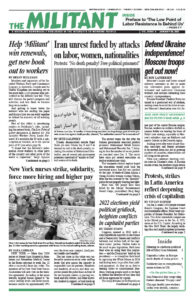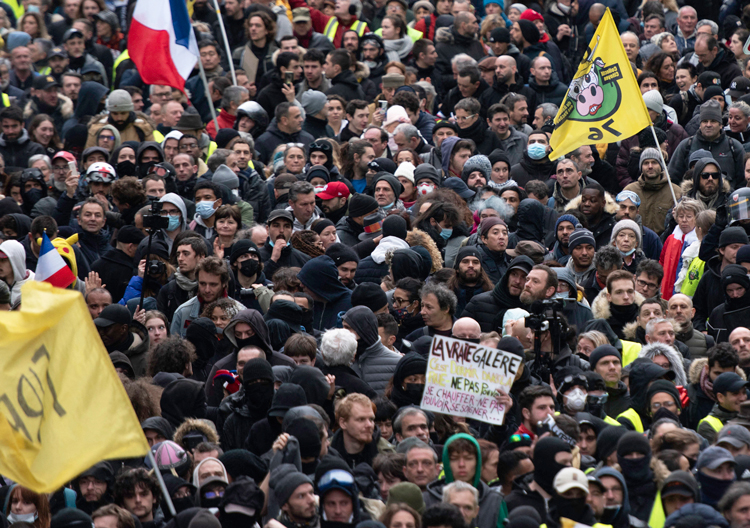The big-business media is hailing the slight drop in inflation rates in Europe last month as a sign that the capitalist rulers are getting price rises under control. But this masks the intolerable impact that decades-high levels continue to have on the living standards of working people there and worldwide, as well as clear indications the scourge of inflation will continue.
“Falling French inflation sparks hope of end to Europe’s price surge,” predicted a Jan. 4 Financial Times article. “Eurozone inflation returns to single figures in sharper than expected fall,” the paper said two days later, reporting that consumer prices rose at a 9.2% annual rate in December, a drop from 10.1% the previous month. But at 9.2%, workers’ real wages are still being eaten up, making it ever harder to make ends meet.
Accounting for this drop was a nine percentage point decline in eurozone energy prices to 25.7% for December over the past year. It declined largely because of governments’ subsidized payments for steeply rising energy bills affecting working people, hoping to curtail protests against these conditions. But such stimulus programs themselves exacerbate inflation, with the printing of more money to fund them leading to higher prices down the road.
In Germany, for example, the government paid most of workers’ gas bills for December. Similar such programs have been implemented in Spain, France and other countries in Europe.
This data, admits the Times, indicates that “while falling energy prices have reduced overall inflation, underlying price pressures for other goods and services have remained largely unchanged.”
Periodic bouts of inflation are integral to the long-term crisis of capitalism. “In the face of plummeting profit rates, increasing unemployment, and a rise in working-class resistance, the bourgeoisie will divide over how to attempt to weather the crisis,” writes Jack Barnes, Socialist Workers Party national secretary, in the article “Imperialism’s March Toward Fascism and War” in New International no. 10. “Some capitalist governments will panic and simply begin pumping out money in hopes of buffering the shocks.” In these conditions the supply of money outstrips the commodities that can be purchased and prices are pushed up.
Today working people are beginning to face a period of “stagflation” — a combination of increased prices and falling capitalist production and jobs. Bosses and their governments seek to solve this by demanding greater “sacrifices” from workers, targeting jobs, wages and benefits.
Prices rise; jobs, production decline
In Germany, with Europe’s largest and strongest capitalist economy, manufacturing output continues to fall. In France, tens of thousands have demonstrated in recent weeks demanding higher wages to cover rising prices. French President Emmanuel Macron has announced plans once again to increase the age of retirement from 62 years old by two or three years. A similar proposal in 2019 was defeated as transport workers and fellow unionists organized strikes to oppose it.
Price hikes have hit working people the hardest in countries in Eastern and Central Europe, already vulnerable, and where Moscow’s invasion of Ukraine has had the biggest impact. Inflation is over 16% in Bulgaria, Poland and the Czech Republic; and 31.4% in Moldova. In all these countries working people have taken to the streets to demand wage raises and improved conditions in recent months.
Like the Federal Reserve Bank in the U.S., the European Central Bank has been raising interest rates in an attempt to rein in prices. Utterly indifferent to the consequences these polices will have on workers’ lives, the editors of the Financial Times hailed moves that make job cuts likely as an “opportunity” for some “creative destruction.”
The Central Bank’s decisions are also heightening conflicts among capitalist powers that comprise the EU. It makes it more difficult for the most indebted governments, such as Italy, Greece and Spain, to repay their loans.
The capitalist rulers in Italy face the biggest challenges. The country’s debt is over 145% of its gross domestic product. Rising rates increase the amount of debts to be paid, which the rulers seek to resolve by deepening their attacks on the working class.
What’s needed in the face of these conditions is a fight by the labor movement for cost-of-living escalator clauses in union contracts to ensure wages, Social Security and all other benefits automatically rise to cover inflation, and a union-led fight for a shorter workweek with no cut in pay, to prevent layoffs and loss of wages.


